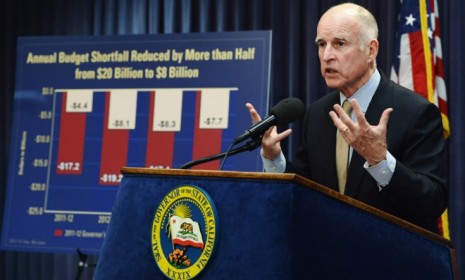California's financial apocalypse: A concise guide
Gov. Jerry Brown says his state is almost $16 billion short on its budget. The 74-year-old Democrat has a plan to close the gap — but Californians won't like it

A free daily email with the biggest news stories of the day – and the best features from TheWeek.com
You are now subscribed
Your newsletter sign-up was successful
California Gov. Jerry Brown (D) has some bad news: His cash-strapped state isn't $9.2 billion in the hole, as projected in January; the Golden State is actually facing a yawning $15.7 billion shortfall. And after years of aggressive budget-slashing and gridlock over increasing tax revenue, Brown doesn't have a lot of options on the table. "The fact is, California has been living beyond its means," he told reporters on Monday. "This is a day of reckoning, and we have to take the medicine." Here, a look at California's bitter pill:
Why did the budget gap grow?
Tax revenue came in $4.3 billion lower than Brown had expected, which he blamed on the still-struggling economy, and courts blocked hundreds of millions in proposed cuts to state health care programs. Also, the Democratic-controlled legislature refused to enact Brown's proposal to trim the social safety net this spring, and Republicans have refused to allow any tax increases, which require a two-thirds majority under California law. The state has already made deep cuts over the past four years to fill a combined $100 billion in deficits, including the $26 billion shortfall Brown inherited when he was sworn in last year.
The Week
Escape your echo chamber. Get the facts behind the news, plus analysis from multiple perspectives.

Sign up for The Week's Free Newsletters
From our morning news briefing to a weekly Good News Newsletter, get the best of The Week delivered directly to your inbox.
From our morning news briefing to a weekly Good News Newsletter, get the best of The Week delivered directly to your inbox.
What does Brown propose to do about it?
The 74-year-old Democrat — who first served as governor from 1975 to 1983 before being elected to a decades-delayed third term in 2010 — has outlined another $8.3 billion in proposed cuts from the budget, which he likened to "a pretzel palace of incredible complexity." About half the cuts would come from social services, inducing $1.2 billion from health care programs for the poor and $1.1 billion from welfare and aid for the home-bound elderly and disabled. State workers would see a 5 percent drop in pay, moving from a five-day, 40-hour week to a four-day, 38-hour week.
But that's not enough, right?
No, it's not. Even if the legislature enacts these cuts in June, California would still come up billions short. But if voters also approve a series of temporary tax bumps Brown got on the ballot for November — a four-year quarter-point rise in the sales tax, to 7.5 percent, and a seven-year increase in taxes on those earning at least $250,000 a year — Brown will be well on his way to righting the state's fiscal ship, as promised. The ballot measure, however, is no sure thing in this "birthplace of the anti-tax movement," says Adam Nagourney at The New York Times. And if it goes down to defeat, California schools automatically take a $6.1 billion hit.
A free daily email with the biggest news stories of the day – and the best features from TheWeek.com
If I don't live in California, why should I care?
First of all, the Golden State, by itself, is the world's ninth-largest economy. And "because of California's sheer size, this will have an impact, however modest, on the overall national picture," says David Dayen at Firedoglake. Brown's multi-billion dollar "austerity hit" will dampen the effectiveness of national economic stimulus measures, as well as "decidedly lowering the productivity of the entire state for decades to come." California's fiscal armageddon should also scare the rest of us into action, says Jennifer Rubin at The Washington Post. "If Greece's economic woes are not a flashing red light for U.S. policymakers, perhaps they will take California's example to heart."
Sources: AP, Bloomberg, Business Insider, Firedoglake, Los Angeles Times, New York Times, Washington Post
-
 Will increasing tensions with Iran boil over into war?
Will increasing tensions with Iran boil over into war?Today’s Big Question President Donald Trump has recently been threatening the country
-
 Corruption: The spy sheikh and the president
Corruption: The spy sheikh and the presidentFeature Trump is at the center of another scandal
-
 Putin’s shadow war
Putin’s shadow warFeature The Kremlin is waging a campaign of sabotage and subversion against Ukraine’s allies in the West